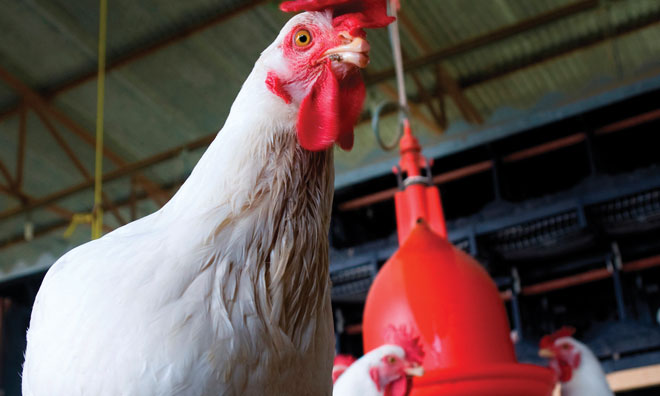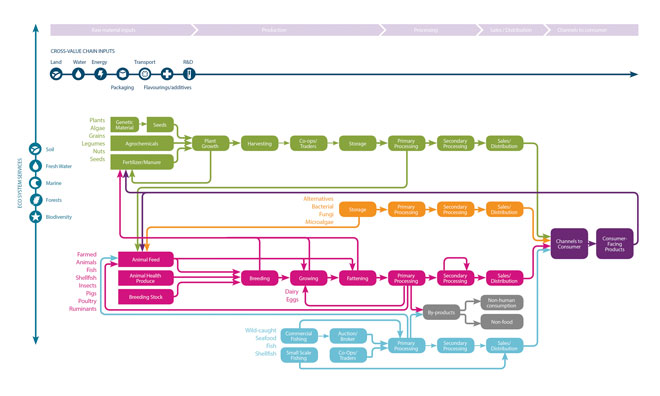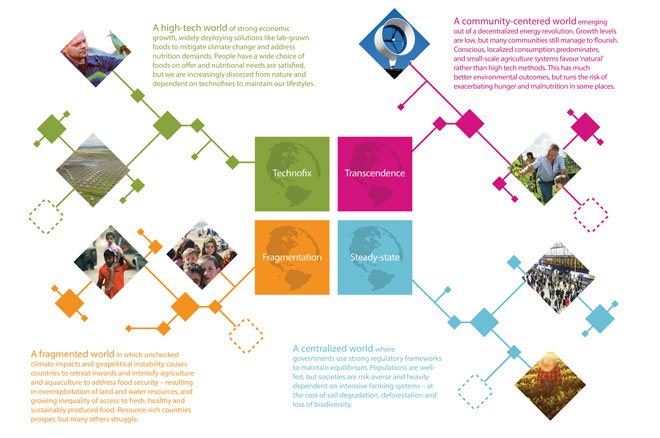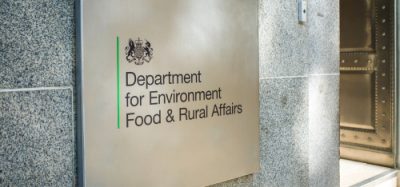The journey to sustainable protein for the future
- Like
- Digg
- Del
- Tumblr
- VKontakte
- Buffer
- Love This
- Odnoklassniki
- Meneame
- Blogger
- Amazon
- Yahoo Mail
- Gmail
- AOL
- Newsvine
- HackerNews
- Evernote
- MySpace
- Mail.ru
- Viadeo
- Line
- Comments
- Yummly
- SMS
- Viber
- Telegram
- Subscribe
- Skype
- Facebook Messenger
- Kakao
- LiveJournal
- Yammer
- Edgar
- Fintel
- Mix
- Instapaper
- Copy Link
Posted: 14 October 2016 | Ivana Gazibara, Head of Futures, Forum for the Future | No comments yet
Amidst an increasingly uncertain political, economic and environmental landscape, food (and protein) security is a key issue that has grown exponentially in interest and momentum over the past year. It has permeated not just the wider debates on climate change action and the future of the UK, but also individual lives and experiences.


On a personal level, my diet has gone through a bit of a revolution. Meat is still a (delicious) friend but one I engage with a lot less than previously. For someone born and bred in the Balkans, this is no mean feat. At the same time, I’ve made new dietary forays; pulses are now a greatly appreciated addition to the household and my two-year-old daughter is growing to love beans. All this has been the result of my work on a project called The Protein Challenge 2040.
Protein is essential for a healthy diet, yet the way in which we currently produce and consume it is having a negative impact on both the environment and human health. This situation is set to intensify if no concerted action is taken; we therefore need to address how we can provide sufficient protein sustainably for a further two billion people by 2040.
This has led us to The Protein Challenge 2040 – a year of enquiry by a most unusual coalition of food companies, retailers, feed companies and NGOs into this central question: How are we going to feed nine billion people enough protein by 2040 in a way that is healthy, affordable and good for the environment?


The global protein system
The Protein Challenge 2040 partnership comprises over 20 organisations including leading NGO WWF; retailers such as Target and Waitrose; food industry businesses such as dairy nutrition firm Volac and taste and flavour experts Firmenich; as well as food manufacturers General Mills, The Hershey Company, Nestle and Quorn. Throughout this process we have also consulted more than 100 organisations working in the protein system, whether through expert interviews or work – shops. It is the first partnership that unites representatives from animal, plant and alternative protein industries to understand the protein systems challenges; identify a common way forward; and find new solutions collectively.
System mapping protein for the first time
Hitherto the animal, plant and alternative protein industries and their value chains, despite being deeply linked, were considered separate and apart. However, in order to address the protein question properly, we knew that we needed to understand the system, in all its complexity, as a whole. Drawing on research and expertise from scientists, stakeholders and experts who participated in our workshops, we worked hard to map the entire protein system – something that has never been done before.
Protein is essential for a healthy diet, yet the way in which we currently produce and consume it is having a negative impact on both the environment and human health…
We used the map to explore interrelationships and inter-dependencies between the four largest protein categories and their supply chains: wild-caught fish, farmed animals, plant proteins (beans, lentils, nuts, seeds), and novel proteins (plant-based meat substitutes, lab meat, whey protein and more). We also captured their social, environmental and nutritional impacts across the map.
Exploring future scenarios
Forum for the Future uses futures tools to track and anticipate change; highlight uncertainty; and inform better decision making today, to prepare for tomorrow. We find that scenarios are invaluable for identifying risks and opportunities, stimulating innovation, and developing future-fit strategies.
We identified a number of global megatrends that we are fairly certain are heading in a certain direction, such as population growth, resource scarcity and increasing competition for land. We also identified trends that we know will drive change in the future, but where the outcomes are far less certain, such as consumer uptake of new technologies, societal responses to climate change impacts and so on. We played with this combination of trends to develop what we believe are four distinct, challenging, plausible scenarios for the future of protein.
Six solution areas for the future
We used these scenarios in a series of workshops in London, New York, Rotterdam and San Francisco, in order to pinpoint the key future challenges for the protein system, and identify the most important areas for innovation and action. This process indicated that multiple areas need to be addressed simultaneously to truly have an impact on the scale required in order to balance affordable and healthy consumption with eco-friendly production.
Encouraging consumption of more plant-based protein
This is about rebalancing diets to include a greater diversity of protein sources, with a higher proportion of plant protein. In the West we are consuming more animal protein than is considered ideal for good health and, in addition, there is a serious issue with raising livestock, as it is associated with half of all agricultural GHG emissions and consumes huge amounts of grain and water1 . However we are slowly beginning to see a shift in policy in this respect. In 2009 the Swedish government became the first in the world to build environmental sustainability considerations into its dietary guidelines. Very recently it was joined by the UK, which advocated more plant-based eating in its recent iteration of dietary guidelines, and the Netherlands, which has advised citizens to reduce their weekly intake of meat to 500g for environmental and health reasons2 . We do think that more could be done in this area, in particular on the part of food retailers, food service companies and manufacturers who have an important role to play inspiring consumers in sustainable meals.
Developing a more diverse range of plants for consumption
There are over 12,000 crop species classified as suitable for human consumption and yet 60% of our calorie intake comes from rice, maize and wheat3. This diet is not only poor for the development of a healthy microbiome, which is critical for human health and relies in part on a richly diverse diet, but it also threatens to undermine food security nutritional outcomes in certain parts of the world. There is some activity in this respect, such as the work of The African Orphan Crops Consortium, which is planning to sequence the genomes of 100 orphan crops with the aim of developing more robust crop varieties, with higher nutritional content. However, there isn’t nearly enough, which is why our work will aim to catalyse innovation in protein rich orphan crops that could improve nutritional outcomes in the developing world.
Changing what we feed animals
Feed production accounts for 45% of the carbon footprint of livestock production. Large swaths of the rainforest are disappearing so that we can plant soy to then feed to animals. This problem is not only confined to land animals – we are rapidly depleting stocks of fish used as fish meal, and increasingly feeding fish what we feed chickens, so aquaculture comes into the equation too. There are pockets of exciting innovation already happening in this area, such as feed produced using methane bacteria and insects that are fed on waste. However, many of these are still not at scale and neither are they joined up. This is exactly what the feed innovation platform will seek to do: help scale innovation in alternative animal feeds that can reduce our over-reliance on environmentally intensive feedstuffs, and deliver high-quality animal nutrition.
Developing aquaculture systems in a sustainable way
There are over 12,000 crop species classified as suitable for human consumption…
Fish is an important source of protein around the world. Aquaculture sustainability is seeing a promising amount of momentum at the moment, with many organisations focused on realising the potential of aquaculture as a future sustainable protein solution for the masses. Together with the innovationXchange of the Australian Government, Conservation X Labs, NineSigma and SecondMuse, WWF has launched a new competition to rethink the future of aquaculture. Also, Aqua-Spark is a global investment fund that makes investments in sustainable aquaculture businesses that generate returns; and Bren Smith is doing incredibly inspirational things with his 3D ocean farm, Thimble Island Ocean Farm. This is to name but a few. We will work with many of these organisations to help ensure that global aquaculture systems are scaled up in a sustainable way.
‘Recycling’ protein
Protein is a critically important micronutrient. In some parts of the world we are overconsuming it, at the expense of both personal and environmental health. However, in other parts of the world, people suffer from protein energy malnutrition (PEM)4. In developing countries this condition impacts around 34% of children under five5 . Establishing closed-loop protein solutions that cycle protein as a nutrient more effectively and reduces protein waste will be key in the future. For example, a potato processing company could potentially extract its protein-rich effluent and sell it to a company looking to add protein to its product; or parts of crops (such as sugar beet leaves) that are usually left to rot in the field, but which are protein rich, could be salvaged and used to improve nutritional balance. Some of these things are already happening, but often on a small-scale and as bilateral commercial agreements that aren’t publicly known. We believe that these practices should be more widely publicised, and good solutions replicated.
Restoring soil health
Many of our stakeholders have queried the choice of this as one of our six innovation areas. However, soil health is a critical factor that underpins the health of the protein system as a whole – indeed the very viability of the agricultural system. Many of today’s soil and crop management systems are unsustainable. At one extreme, overuse of fertiliser has led to nitrogen (N) deposition that threatens the sustainability of an estimated 70% of nature. At the other extreme, the under-use of fertiliser in some parts of the world means that organic matter is not being replenished which leads to the decline of soil structure, soil degradation and declining yields. There are known sustainable solutions for (re)building healthy soils; however, many of these remain at farm level and relatively small-scale or niche. For example, studies have shown that cover cropping, crop rotation and no-till farming could restore global soil health while significantly decreasing farms’ carbon footprints. Our aim through the Protein Challenge 2040 platform is to define a standard for soil health and develop a global advocacy plan for restoring soil health.
Soil health is a critical factor that underpins the health of the protein system as a whole…
These are challenges no single organisation can tackle alone. There needs to be much stronger collaboration between government, business and the not-for-profit sector. Forum for the Future is actively seeking new partnerships to help drive forward and scale solutions in these six areas. If you are an organisation with the resources and expertise that can help, please join us on this journey toward a sustainable protein system.
References
- http://www.theguardian.com/environment/2014/jul/21/giving-up-beef-reduce
- http://www.foodnavigator.com/Policy/A-sustainable-breakthrough-Dutch…
- http://www.fao.org/docrep/007/y5609e/y5609e02.htm
- A form of malnutrition where there is inadequate protein intake
- http://www.fao.org/docrep/w0073e/w0073e05.htm
About the author
Ivana Gazibara is Head of Futures at international sustainability non-profit Forum for the Future.
To find out more about The Protein Challenge 2040, email Ivana at [email protected] or visit www.forumforthefuture.org









